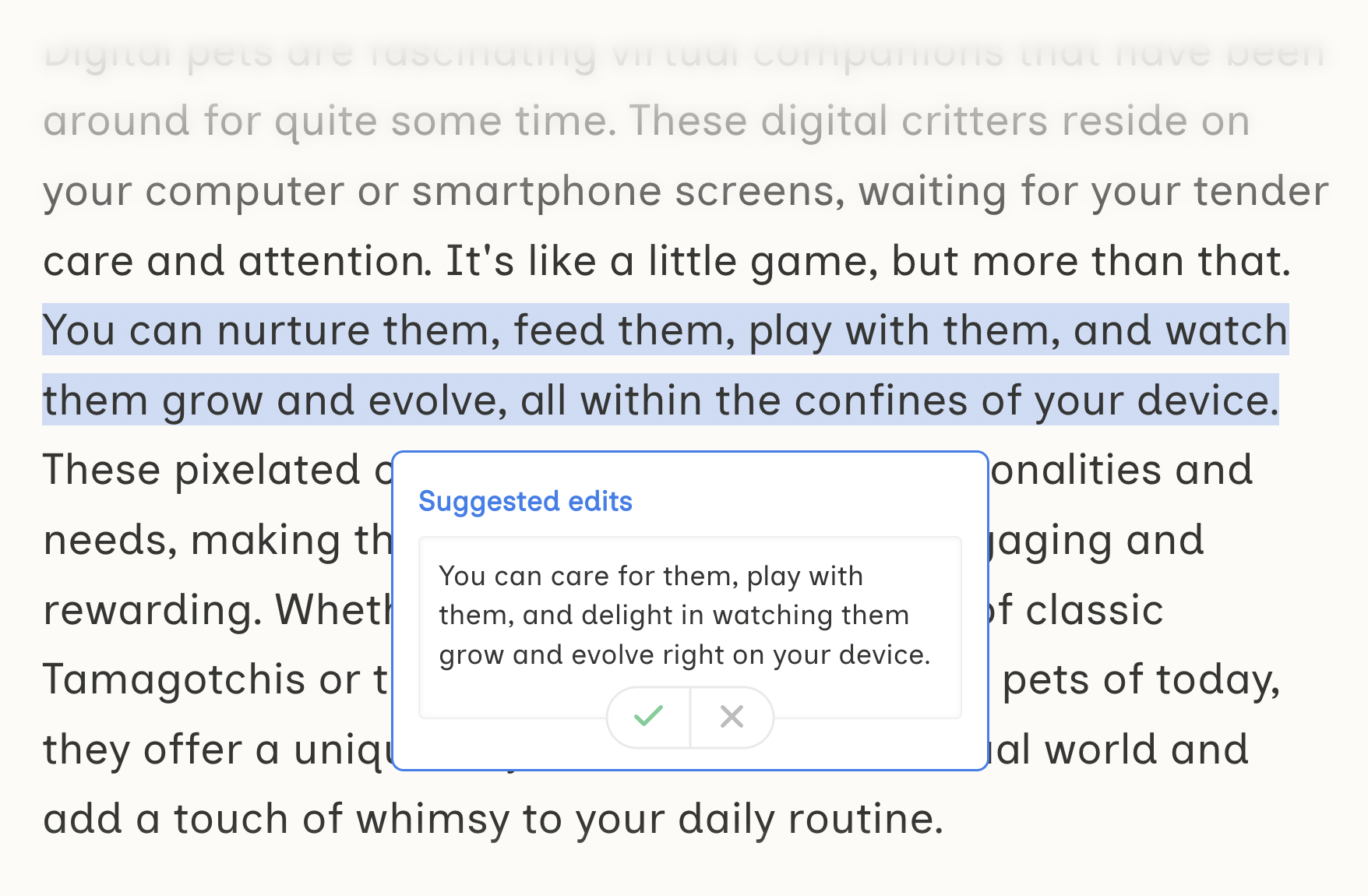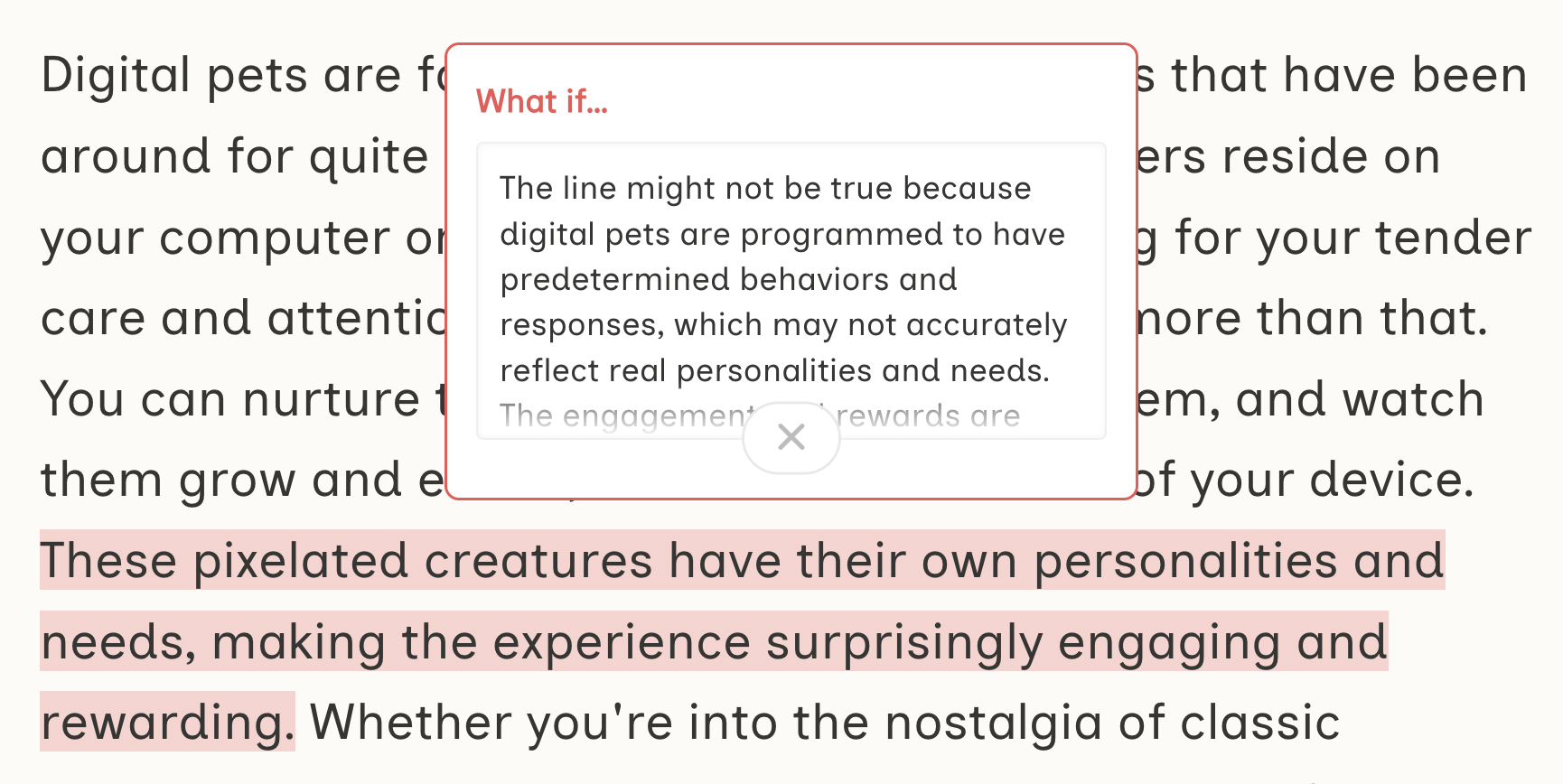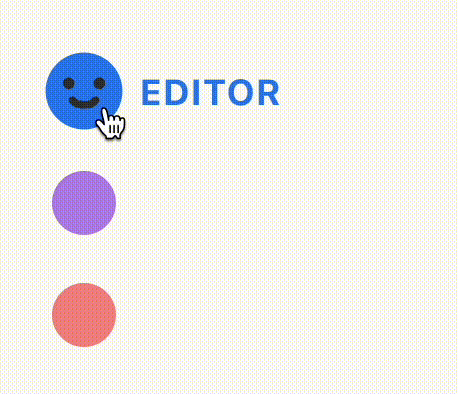Prototyping language model interactions
Ft. Langchain and a toy text editor
I've been playing with a prototype (code here) of "writing daemons", riffing off of Maggie Appleton's amazing work. What does it feel like to write in the company of little spirits – not much unlike Clippy – who can jump in with suggestions and reactions?
 Suggested
writing improvements by the strict Editor
Suggested
writing improvements by the strict Editor
 Some
thoughts from the Devil's Advocate
Some
thoughts from the Devil's Advocate
A tiny technique aside
I used Langchain and OpenAI to prompt the daemon personalities. Each daemon option is set up with a prompt instruction (passed into a Langchain PromptTemplate) used to control the output. Beyond the current 3 options, I also had fun interactions with variations of "Concerned Parent" and "Supportive Friend". It turns out personality and style prompting is the real fun that I miss from GPT chatbots.

{ title: "Editor", subtitle: "Suggested edits", prompt: "As a strict writing editor, suggest a weak line that can be improved for clarity, grammar, punctuation.", color: "47, 128, 237", }, { title: "Researcher", subtitle: "Cite your sources", prompt: "As a scientific researcher, suggest a line that contains a fact and find an online source to support it.", color: "151, 81, 224", }, { title: "Devil", subtitle: "What if...", prompt: "As a devil's advocate, find a line from the text and suggest how it might not be true.", color: "235, 87, 87", }
With Langchain's StructuredOutputParser, a Zod schema, and this prompt template (where "prompt" is the daemon personality), I was able to coax gpt-3.5-turbo. It analyzes the text, selects a line, and provides a suggestion in the style of the selected daemon:
const prompt = new PromptTemplate({ template: "{prompt}. Follow the format instructions, no matter what! \n{format_instructions}\n{text}", inputVariables: ["text", "prompt"], partialVariables: { format_instructions }, });
Towards a "tool"?
The spirit I built this with leaned towards cheeky novelty instead of usefulness. To extend it into something more pragmactic, there's some factors I would consider:
- Control: Not knowing where the model would point to as a stand-out sentence diminishes it's usefulness. Approaches that lend more control to the person could involve manually highlighting sections or paragraph-by-paragraph processing. Or even visualizing phrases along a scale à la Amelia Wattenberger's experiments with embeddings?
- Choices: For suggested edits, a "one-shot" answer doesn't feel satisfactory. Even when I added detail to the the personality prompts, and even when the suggestion seemed solid, I wondered if the model had gone down an arbitrary direction. I wanted to see adjacent options, because what if there was another dimension I hadn't considered? Navigating the latent space...
On visions for computing
Why am I drawn towards making "useless" things that feel joyful, sandbox-y, even juvenile? Besides my limited technical skills (but growing!) and attention span (not growing...), it's a reaction to the ethos of superintelligence posed to process information at the scale of humanity . When zoomed into one person's experience with their computer, I'm not sure if an all-knowing computer agent is the most compelling vision. At least not austere, computer-knows-best, or even the Samantha-from-Her embodiments.
Instead of superintelligent agents and automation and single answers, I want to feel a sense of agency and exploration and possibility. And maybe an AI spiritual successor to Clippy can help with that, sometimes. I hope to get closer to communicating my understanding of the computer feeling through making these prototypes.
Down the rabbit hole
- Matt Webb on AI-as-a-teammate – as in dolphin-NPCs-as-cursors for fine-grained interactions, many more delightful prototypes
- A short film from Keiichi Matsuda and Niantic that speculates on a hopeful future where people live in an ecosystem of programmable agents
- A Small Matter of Programming: Perspectives on End User Computing by Bonnie Nardi – more on alternatives to the agent metaphor for personal computing
- Dream Machines by Ted Nelson (that's the PDF) – an electic tour of the pre-PC world of computing as a medium
- The work of Bret Victor and Dynamicland on demos that had limited use IRL, maybe because they were very much toys and didn't have a community they were serving?! They're inspiring, but I don't want that to be my fate haha :'D